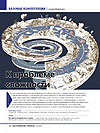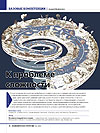Transformation of Economic Globalization in the Context of the Development of the World Community Along the Path of Multipolarity
DOI: 10.33917/es-6.192.2023.16-29
The development of the world economy in modern conditions is being transformed under the influence of a number of factors, which are both man-made and caused by the imperfection of the system of economic relations that have developed as a result of the absolute denial of state regulation and attempts to replace it with supranational rules. The basic determinants were the recommendations of the Washington Consensus (1992), aimed at accelerating the transition to a market economy of transformational economies after the collapse of the USSR. In the early 2000s, a similar approach was extended to all developing economies. This made it possible to accelerate the process of economic globalization, which was fundamentally based on the internationalization of reproductive value chains. The development of the world community along the path of polycentrism determines the transformation of economic globalization in terms of both driving forces and regional localization.
The purpose of this article is to analyze the transformation of economic globalization in the context of the transition from an American-centric model of the world economy to a multipolar structure of the world community.
References:
1. Anan’in O., Khaitkulov R., Shestakov D. Vashingtonskiy konsensus: peyzazh posle bitv [Washington Consensus: Landscape after the Battles]. Mirovaya ekonomika i mezhdunarodnye otnosheniya, 2010, no 12, pp. 15–27, available at: https://doi.org/10.20542/0131-2227-2010-12-15-27
2. A world of debt. A growing burden to global prosperit y 2023. Unctad, available at: https://unctad.org/publication/world-of-debt
3. Struktura VVP SShA po sektoram ekonomiki v 1975–2010 godakh [Structure of US GDP by Economic Sector in 1975–2010]. Politicheskiy atlas sovremennosti, available at: http://www.hyno.ru/tom3/1089.html
4. Tessa Smith.Dying Cities: 10 Big U.S. Cities That Are Shrinking at an Alarming Rate. MSN, available at: https://www.msn.com/en-us/money/realestate/
dying-cities-10-big-u-s-cities-that-are-shrinking-at-an-alarming-rate/ss-AA1eGfQ
5. Countries in the world by population. Worldometers, 2023. URL: https://www.worldometers.info/world-population/population-by-country/
6. Perskaya V.V., Eskindarov M.A. Politsentrizm [Polycentrism]. Moscow, KURS, 2022, 288 p.
7. Human Development Report 2021–2022. Brookings, November 4, 2022, available at: https://www.brookings.edu/blog/future-development/2022/11/04/human-development-in-an-age-of-uncertainty/?utm_campaign=Global Economy
8. Global Value Chains. The World Bank, available at: https://www.worldbank.org/en/topic/global-value-chains
9. Giorgia Giovannetti, Enrico Marvasi & Giorgio Ricchiuti. The Future of Global Value Chains and International Trade: An EU Perspective. Italian Economic Journal, 2023, available at: https://link.springer.com/article/10.1007/s40797-023-00252-4
10. OESR ozhidaet rosta mirovogo VVP v 2023 godu na 3% [The OECD Expects Global GDP to Grow by 3% in 2023]. Interfax.ru, available at: https://www.interfax.ru/busness/921478







